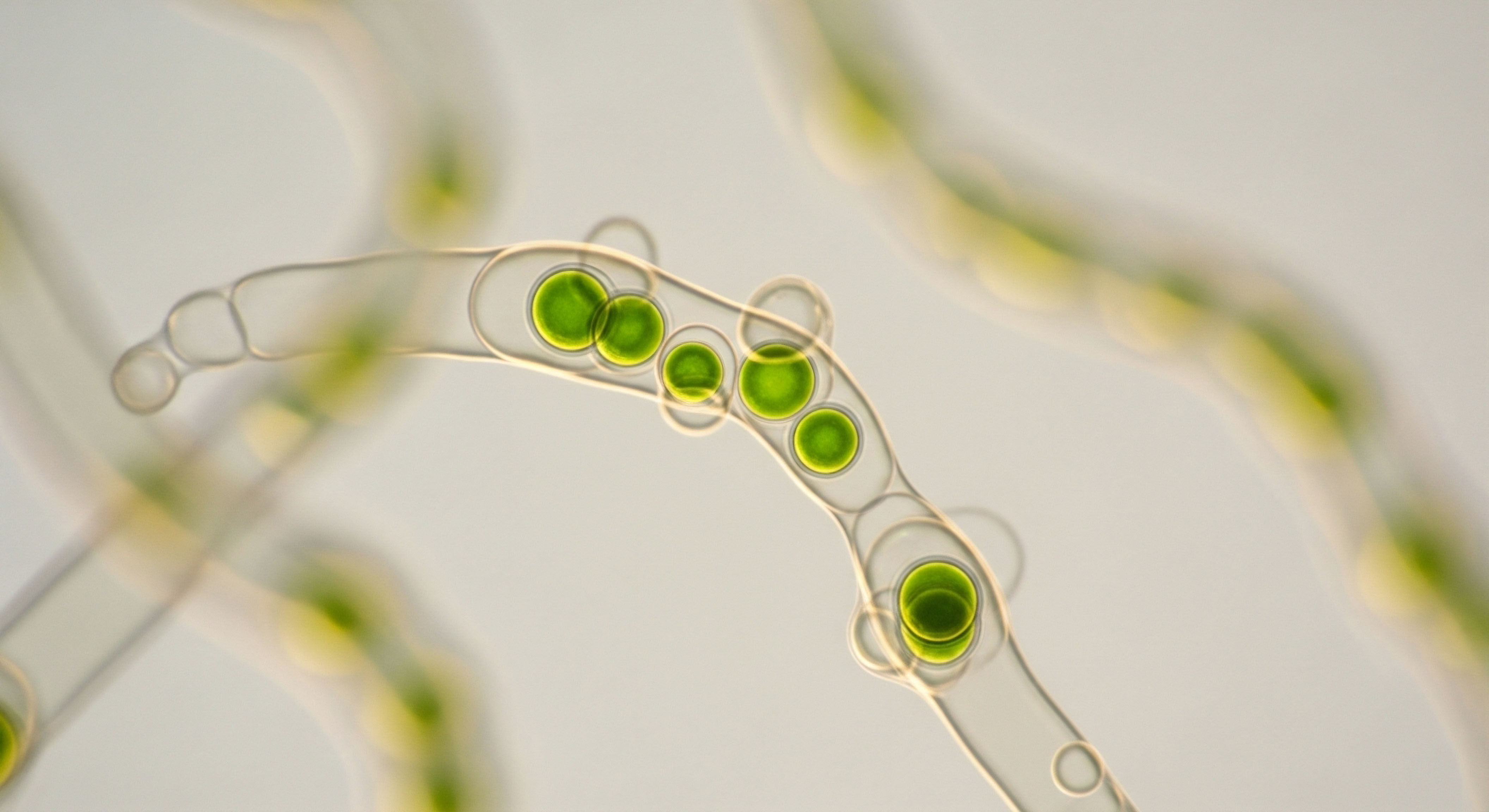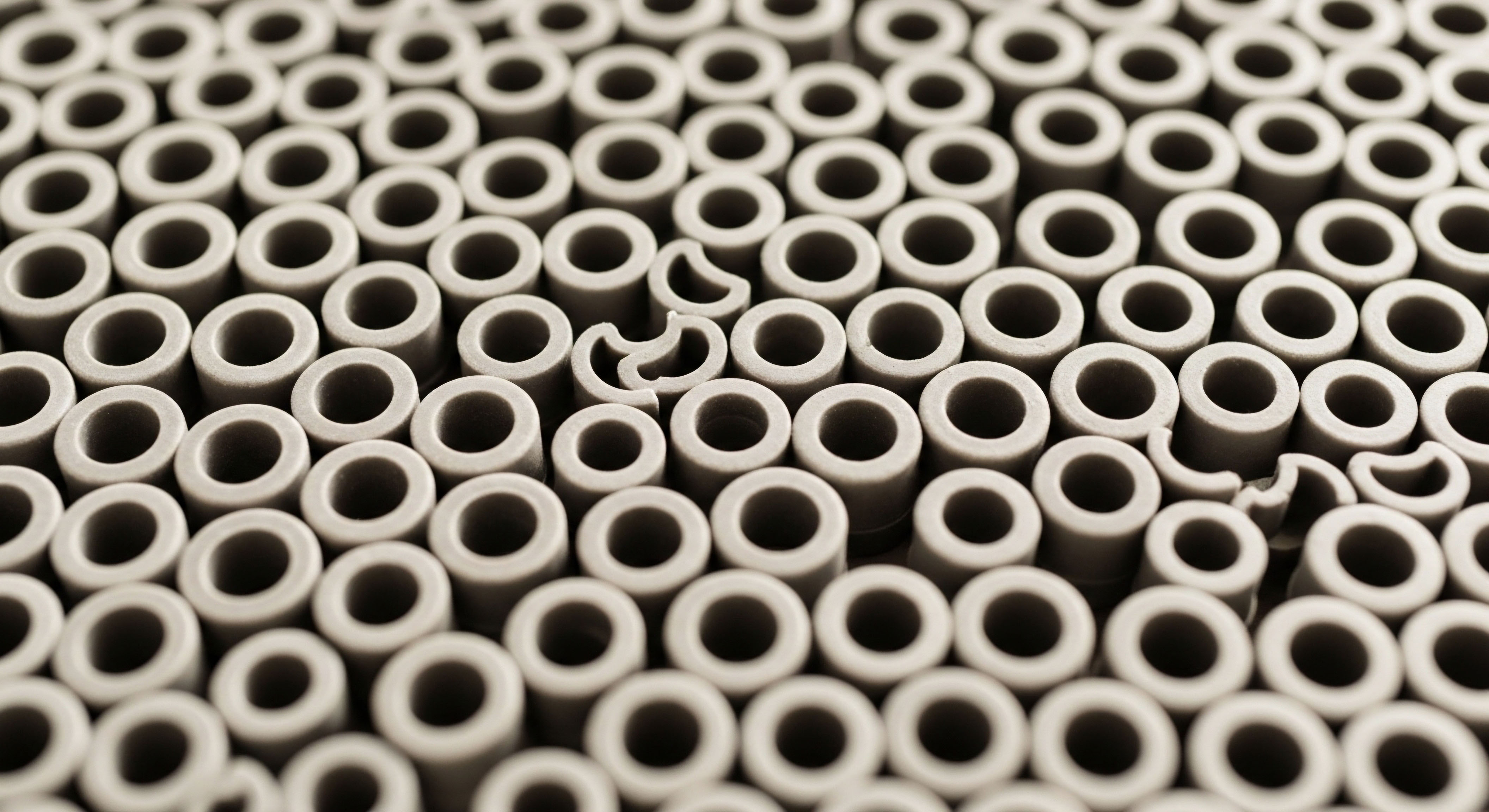

Fundamentals
When you find yourself waking each morning feeling as though you have run a marathon through the night, or perhaps noticing a persistent dullness in your cognitive sharpness, it is natural to seek explanations. Many individuals experience a subtle yet pervasive decline in vitality, a sense that their body’s internal systems are not quite operating in concert.
This lived experience of diminished energy, reduced physical capacity, or a general lack of zest often points toward deeper physiological imbalances. Understanding these shifts within your own biological framework is the initial step toward reclaiming a robust sense of well-being.
Hormonal health forms a central pillar of this internal balance. Hormones serve as the body’s intricate messaging network, orchestrating countless processes from metabolism and mood to muscle maintenance and reproductive function. Among these vital chemical messengers, testosterone holds a significant position for both men and women.
While often associated primarily with male physiology, testosterone plays a critical role in female health, influencing bone density, muscle mass, libido, and overall energy levels. When the body’s natural production of this hormone falters, a cascade of symptoms can arise, prompting individuals to consider interventions such as testosterone replacement therapy.
The concept of restoring hormonal equilibrium through targeted protocols is a powerful one. Testosterone replacement therapy, or TRT, involves introducing exogenous testosterone to supplement the body’s own declining output. This approach aims to alleviate symptoms associated with low testosterone, such as persistent fatigue, reduced muscle strength, changes in body composition, and diminished sexual drive. For many, TRT offers a pathway to improved physical function and a renewed sense of vigor.
A persistent feeling of low vitality often signals underlying hormonal imbalances, with testosterone playing a key role in overall well-being for both men and women.
However, the effectiveness of any therapeutic intervention, including TRT, is not solely dependent on the administered dose. The human body is a complex, interconnected system, and external factors profoundly influence internal biochemical processes. One such factor, often underestimated in its impact, is sleep. Sleep is not merely a period of inactivity; it is a dynamic state of profound physiological restoration. During restful periods, the body engages in critical repair mechanisms, consolidates memories, and, significantly, regulates hormonal production.

The Circadian Rhythm and Hormonal Synchronization
The body operates on an internal clock, known as the circadian rhythm, which dictates the ebb and flow of various biological functions over a 24-hour cycle. This rhythm profoundly influences hormone secretion. Testosterone, for instance, exhibits a distinct diurnal pattern, with levels typically reaching their peak during sleep and declining throughout the waking hours. This nocturnal surge in testosterone is not simply a coincidence; it reflects the body’s reliance on undisturbed rest for optimal endocrine activity.
Disruptions to this natural sleep-wake cycle can directly interfere with the body’s ability to synthesize and release testosterone effectively. Even a single week of restricted sleep, such as limiting rest to five hours per night, has been shown to reduce testosterone levels by 10-15% in healthy young men. This reduction is comparable to the decline observed over a decade of aging, underscoring the profound and rapid impact of insufficient rest on hormonal status.
The relationship between sleep and testosterone is reciprocal. While inadequate sleep can lower testosterone levels, a deficiency in testosterone can also contribute to sleep disturbances, creating a challenging cycle. Individuals with low testosterone often report fragmented sleep, difficulty initiating rest, and a reduced proportion of deep, restorative sleep stages. This intricate connection highlights why addressing sleep quality is not a peripheral concern but a central component of any comprehensive hormonal health strategy.

The Hypothalamic-Pituitary-Gonadal Axis and Sleep’s Influence
At the core of hormonal regulation lies the hypothalamic-pituitary-gonadal (HPG) axis, a sophisticated feedback system involving the hypothalamus in the brain, the pituitary gland, and the gonads (testes in men, ovaries in women). The hypothalamus releases gonadotropin-releasing hormone (GnRH), which signals the pituitary to produce luteinizing hormone (LH) and follicle-stimulating hormone (FSH). These gonadotropins then stimulate the gonads to produce testosterone and other sex hormones.
Sleep exerts a significant influence over this axis. Deep sleep, particularly slow-wave sleep (SWS), appears to have an inhibitory effect on the hypothalamic-pituitary-adrenal (HPA) axis, which governs the body’s stress response and cortisol production. Conversely, deep sleep enhances the activity of the growth hormone (GH) axis.
When sleep is fragmented or insufficient, the HPA axis becomes activated, leading to elevated levels of cortisol, often referred to as the stress hormone. This increase in cortisol can directly suppress testosterone production and interfere with its actions.
An acute period of sleep deprivation can lead to what is termed pituitary hypogonadism, where the pituitary gland’s ability to release LH is impaired, resulting in a subsequent decrease in testosterone levels. This mechanism illustrates that even short-term sleep disturbances can have measurable effects on the endocrine system, impacting not only endogenous hormone production but also potentially compromising the efficacy of exogenous hormone therapies.


Intermediate
For individuals undergoing hormonal optimization protocols, particularly testosterone replacement therapy, the interplay between administered hormones and the body’s intrinsic regulatory systems becomes a critical consideration. The goal of TRT is to restore physiological levels of testosterone, alleviating symptoms and improving overall well-being. However, the effectiveness of this intervention can be significantly modulated by lifestyle factors, with sleep emerging as a powerful determinant of treatment outcomes.

Understanding Testosterone Replacement Protocols
Testosterone replacement therapy is not a one-size-fits-all solution; it involves tailored protocols designed to meet individual needs. For men, a common approach involves weekly intramuscular injections of Testosterone Cypionate, typically at a concentration of 200mg/ml. Doses generally range from 50-100mg weekly or 100-200mg every two weeks, adjusted based on patient response and blood levels.
To maintain the body’s natural testosterone production and preserve fertility, many male TRT protocols incorporate adjunctive medications. Gonadorelin, a synthetic peptide that mimics gonadotropin-releasing hormone (GnRH), is often administered via subcutaneous injections, typically twice weekly. This helps stimulate the pituitary gland to continue releasing LH and FSH, supporting testicular function.
Another common addition is Anastrozole, an aromatase inhibitor, taken orally twice weekly to prevent the conversion of exogenous testosterone into excessive estrogen, which can lead to undesirable side effects like gynecomastia or water retention. In some cases, Enclomiphene may be included to specifically support LH and FSH levels, offering an alternative strategy to stimulate endogenous testosterone production, particularly for men concerned with fertility.
For women, testosterone replacement protocols are distinctly different, employing much lower doses to avoid masculinizing effects. Women typically receive Testosterone Cypionate via subcutaneous injection, often 10-20 units (0.1-0.2ml) weekly, or a starting dose around 50mg weekly, though lower doses of 2-10mg per week or 10-40mg monthly are often recommended.
The objective is to achieve testosterone levels within the upper range of normal female values. Progesterone is frequently prescribed alongside testosterone, especially for peri-menopausal and post-menopausal women, as it plays a vital role in hormonal balance, endometrial protection, and can significantly improve sleep quality and reduce vasomotor symptoms.
Pellet therapy, involving long-acting subcutaneous testosterone pellets, sometimes combined with Anastrozole, offers a consistent hormone delivery method for women, providing sustained relief from menopausal symptoms and supporting overall hormonal health.
Effective testosterone therapy involves precise, individualized protocols, often combining testosterone with adjunctive medications to manage estrogen levels and preserve natural hormone production.

How Sleep Deprivation Compromises Therapy
Even with meticulously calibrated TRT protocols, insufficient or disrupted sleep can significantly diminish their efficacy. The body’s internal environment, shaped by sleep patterns, directly influences how administered hormones are processed, utilized, and metabolized.
One primary mechanism involves the HPA axis activation. Chronic sleep deprivation elevates cortisol levels. When cortisol is persistently high, it creates a catabolic state within the body, counteracting the anabolic effects of testosterone. This means that even if exogenous testosterone is introduced, the elevated stress hormone can impede its ability to promote muscle growth, tissue repair, and overall vitality. The body struggles to build and restore when it is constantly in a state of perceived stress.
Sleep also plays a critical role in growth hormone secretion. The majority of growth hormone is released during deep sleep, particularly slow-wave sleep. Growth hormone is essential for cellular repair, muscle protein synthesis, and fat metabolism. If sleep is consistently inadequate, growth hormone release is suppressed, undermining the regenerative processes that TRT aims to support.
This creates a scenario where the benefits of testosterone, such as increased muscle mass and reduced body fat, may not be fully realized due to a concurrent deficiency in growth hormone signaling.
Furthermore, sleep deprivation can worsen insulin sensitivity. Poor sleep is linked to increased insulin resistance, which can lead to higher blood sugar levels and an altered metabolic profile. This metabolic dysregulation can indirectly affect hormonal balance, potentially impacting the effectiveness of testosterone and contributing to a less favorable body composition, even on therapy.

Sleep States and Hormonal Impact
The different stages of sleep have distinct hormonal implications.
| Sleep Stage | Key Hormonal Activity | Impact of Disruption |
|---|---|---|
| Non-REM Sleep (Stages 1-3) | Decreased cortisol, increased growth hormone, peak testosterone secretion | Reduced anabolic signaling, impaired tissue repair, lower testosterone levels |
| Slow-Wave Sleep (Deep Sleep) | Highest growth hormone and testosterone production, HPA axis suppression | Significant reduction in restorative processes, heightened stress response |
| REM Sleep | Increased HPA axis activity, cortisol pulses, brain activation | Fragmented REM can lead to chronic HPA activation, impacting overall hormonal rhythm |
The body’s ability to maintain a healthy testosterone-cortisol balance is severely challenged by sleep debt. When testosterone levels are low and cortisol levels are high, the body shifts into a catabolic state, hindering recovery and diminishing the positive effects of TRT. This imbalance can manifest as persistent fatigue, difficulty recovering from physical exertion, and a general feeling of being unwell, despite receiving testosterone therapy.

Optimizing Sleep for Enhanced Therapeutic Outcomes
Integrating sleep optimization strategies into a personalized wellness protocol is paramount for maximizing the benefits of testosterone therapy. It is not enough to simply administer hormones; the internal environment must be conducive to their optimal function.
Consider these practical steps to support restorative sleep ∞
- Consistent Schedule ∞ Adhere to a regular sleep and wake time, even on weekends, to reinforce the body’s natural circadian rhythm.
- Optimized Environment ∞ Ensure the sleeping space is dark, quiet, and cool.
Eliminate light sources, minimize noise, and maintain a comfortable temperature.
- Pre-Sleep Rituals ∞ Establish a calming routine before bedtime, such as reading, a warm bath, or gentle stretching, to signal to the body that it is time to wind down.
- Limit Stimulants ∞ Avoid caffeine and nicotine, especially in the afternoon and evening, as these substances can interfere with sleep architecture.
- Mindful Nutrition ∞ Avoid heavy meals close to bedtime.
Consider a light, protein-rich snack if hunger is a concern.
- Screen Discipline ∞ Reduce exposure to blue light from electronic devices at least an hour before sleep, as it can suppress melatonin production.
- Regular Movement ∞ Incorporate consistent physical activity during the day, but avoid intense exercise too close to bedtime.
By consciously addressing sleep quality, individuals on testosterone therapy can create a more receptive physiological environment, allowing the administered hormones to exert their intended effects more fully. This holistic perspective acknowledges that true vitality arises from the harmonious functioning of all biological systems.


Academic
The intricate relationship between sleep architecture and endocrine function represents a sophisticated area of neuroendocrinology. While the foundational understanding of sleep’s impact on testosterone is clear, a deeper exploration reveals the molecular and systemic complexities that underpin this interaction, particularly in the context of exogenous hormonal interventions. The efficacy of testosterone replacement therapy is not merely a function of dosage; it is profoundly influenced by the endogenous milieu, which sleep profoundly shapes.

Neuroendocrine Regulation of Sleep and Hormonal Axes
The central nervous system orchestrates sleep stages, and these stages, in turn, modulate the activity of various hormonal axes. The hypothalamic-pituitary-gonadal (HPG) axis and the hypothalamic-pituitary-adrenal (HPA) axis are particularly sensitive to sleep quality and duration.
Testosterone secretion is highly dependent on sleep, with peak levels occurring during the deepest stages of non-REM sleep, specifically slow-wave sleep (SWS). This sleep-dependent increase in testosterone requires at least three hours of SWS for optimal effect. The pulsatile release of luteinizing hormone (LH), which stimulates testicular testosterone production, is also influenced by sleep, exhibiting increased amplitude during nocturnal rest.
Conversely, sleep deprivation acts as a significant physiological stressor, activating the HPA axis. This activation leads to an increased secretion of cortisol, particularly in the afternoon and evening. Cortisol, being a glucocorticoid, exerts a suppressive effect on the HPG axis at multiple levels, including the hypothalamus (reducing GnRH release) and the pituitary (reducing LH and FSH secretion), ultimately diminishing endogenous testosterone production.
The reciprocal changes observed ∞ lower testosterone and higher cortisol ∞ create an unfavorable anabolic-catabolic balance, where catabolic processes dominate, hindering tissue repair and metabolic efficiency.
Beyond the HPG and HPA axes, sleep also profoundly impacts the growth hormone (GH) axis. Growth hormone is predominantly released during SWS, playing a critical role in cellular regeneration, protein synthesis, and lipolysis. Chronic sleep restriction suppresses GH secretion, thereby compromising the body’s restorative capacity and potentially limiting the anabolic benefits of testosterone therapy. This creates a scenario where the systemic support for muscle growth and fat reduction, often sought through TRT, is undermined by inadequate sleep.

Clinical Evidence on Sleep Deprivation and TRT Outcomes
While direct, large-scale clinical trials specifically examining the reduced effectiveness of exogenous testosterone therapy due to sleep deprivation are still emerging, the mechanistic understanding and observational data provide compelling insights. Studies consistently demonstrate that sleep restriction, even for short durations, leads to a significant reduction in endogenous testosterone levels in healthy individuals. This foundational physiological response suggests that an ongoing state of sleep debt would create a less responsive environment for administered testosterone.
For instance, a study on healthy young men found that a week of sleeping less than five hours per night resulted in a 10-15% decrease in testosterone levels. This magnitude of decline is substantial and indicates that the body’s baseline hormonal milieu is compromised. When exogenous testosterone is introduced into such a system, it must contend with elevated cortisol, suppressed growth hormone, and potentially altered receptor sensitivities, which could attenuate its therapeutic impact.
The relationship is further complicated by the bidirectional nature of sleep and hormones. While sleep deprivation can lower testosterone, high-dose testosterone therapy itself has been observed to interfere with sleep architecture, reducing total sleep time and potentially worsening conditions like obstructive sleep apnea (OSA).
This creates a challenging feedback loop ∞ low testosterone may contribute to poor sleep, TRT is initiated, but if sleep hygiene is not addressed, the therapy’s full benefits may not be realized, and in some cases, high doses could even exacerbate sleep disturbances, perpetuating the cycle.
Sleep deprivation activates the HPA axis, elevating cortisol and suppressing growth hormone, which can counteract the anabolic effects of testosterone therapy.

Interplay with Metabolic Pathways and Neurotransmitter Function
The impact of sleep deprivation extends beyond direct hormonal axes, influencing broader metabolic and neurological pathways that indirectly affect testosterone therapy. Chronic sleep loss is associated with increased insulin resistance, leading to dysregulation of glucose metabolism. Insulin sensitivity is closely linked to testosterone levels; improved insulin sensitivity can support healthier testosterone profiles. When sleep debt compromises insulin signaling, it can create a metabolic environment less conducive to the anabolic actions of testosterone.
Sleep also influences the balance of appetite-regulating hormones, such as leptin and ghrelin. Sleep deprivation tends to increase ghrelin (hunger hormone) and decrease leptin (satiety hormone), promoting increased caloric intake and potentially contributing to weight gain. Adiposity, particularly visceral fat, is known to increase aromatase activity, leading to greater conversion of testosterone to estrogen. This can necessitate higher doses of aromatase inhibitors like Anastrozole in TRT protocols, adding another layer of complexity.
The central nervous system’s neurotransmitter balance is also affected by sleep. Neurotransmitters like dopamine, serotonin, and norepinephrine play roles in mood, motivation, and cognitive function, all of which are symptoms targeted by testosterone therapy. Sleep deprivation can alter the synthesis and receptor sensitivity of these neurotransmitters, potentially blunting the improvements in mood and cognitive clarity that TRT aims to provide.

Targeted Peptide Therapies for Sleep and Synergy with TRT
Specific peptide therapies offer a promising avenue for improving sleep quality, thereby potentially enhancing the effectiveness of testosterone therapy. These peptides often work by stimulating the natural release of growth hormone, which, as discussed, is intimately linked with restorative sleep.
| Peptide | Mechanism of Action | Sleep-Related Benefits |
|---|---|---|
| Sermorelin | Stimulates pituitary to release growth hormone | Encourages deeper, more restorative sleep; improves sleep quality |
| Ipamorelin / CJC-1295 | Mimics ghrelin, stimulates GH release, extends SWS | Promotes deep sleep, physical recovery, and overall well-being; enhances sleep depth and quality |
| MK-677 (Ibutamoren) | Mimics ghrelin, promotes GH production | Reduces time to sleep onset, increases REM sleep length, improves sleep quality |
| Tesamorelin | Growth hormone-releasing hormone (GHRH) analog | Supports natural GH pulsatility, potentially improving sleep architecture (indirectly) |
| Hexarelin | Growth hormone secretagogue | Stimulates GH release, potentially aiding recovery and sleep (indirectly) |
The strategic inclusion of these growth hormone secretagogue peptides can address the sleep deficit that often accompanies hormonal imbalances and modern lifestyles. By promoting deeper, more restorative sleep, these peptides can help normalize the HPA axis, reduce cortisol, and optimize the nocturnal surge of endogenous growth hormone and testosterone. This creates a more favorable physiological environment, allowing the body to better utilize exogenous testosterone and achieve superior therapeutic outcomes.
Beyond sleep, other targeted peptides, such as PT-141 for sexual health and Pentadeca Arginate (PDA) for tissue repair and inflammation, contribute to overall well-being, which indirectly supports hormonal balance. PT-141 works on the central nervous system to increase sexual desire, offering a distinct mechanism from traditional erectile dysfunction medications.
PDA, with its potent anti-inflammatory and regenerative properties, aids in recovery from physical stress and injury, reducing systemic burden. A body that is well-rested, recovering efficiently, and experiencing enhanced vitality is inherently more responsive to hormonal optimization.

Can Sleep Deprivation Reduce the Effectiveness of Testosterone Therapy? a Systems Perspective
From a systems-biology perspective, sleep deprivation does not merely reduce the effectiveness of testosterone therapy; it creates a systemic environment that actively counteracts its benefits. The body’s intricate feedback loops and interconnected pathways mean that a disruption in one area, such as sleep, propagates throughout the entire endocrine and metabolic network.
Consider the following chain of events ∞
- Sleep Restriction ∞ Leads to insufficient slow-wave sleep.
- HPA Axis Activation ∞ Results in elevated cortisol levels.
- HPG Axis Suppression ∞ High cortisol directly inhibits GnRH, LH, and FSH, reducing endogenous testosterone production.
- Growth Hormone Suppression ∞ Lack of deep sleep reduces nocturnal GH release.
- Metabolic Dysregulation ∞ Increased insulin resistance and altered leptin/ghrelin balance promote fat accumulation and inflammation.
- Compromised TRT Efficacy ∞ Exogenous testosterone enters a system already burdened by catabolism, suppressed anabolism, and metabolic stress.
The therapeutic effects are diminished because the body is not in an optimal state to receive and utilize the hormone.
- Bidirectional Negative Feedback ∞ In some cases, high-dose TRT might worsen sleep apnea, further exacerbating sleep quality and perpetuating the cycle.
This cascading effect underscores that optimizing sleep is not an optional adjunct to testosterone therapy; it is a fundamental prerequisite for achieving and sustaining optimal hormonal health. A truly effective personalized wellness protocol must address the foundational elements of lifestyle, ensuring that the body’s intrinsic restorative mechanisms are fully supported. Without adequate, high-quality sleep, the pursuit of hormonal balance through exogenous means becomes an uphill battle against the body’s own stress responses and metabolic inefficiencies.

References
- Leproult, R. & Van Cauter, E. (2011). Effect of 1 week of sleep restriction on testosterone levels in young healthy men. JAMA, 305(21), 2174-2175.
- Lee, D. S. Choi, J. B. & Sohn, D. W. (2019). Impact of Sleep Deprivation on the Hypothalamic-Pituitary-Gonadal Axis and Erectile Tissue. Journal of Sexual Medicine, 16(1), 5-16.
- Spiegel, K. Leproult, R. & Van Cauter, E. (1999). Impact of sleep deprivation on the hypothalamic-pituitary-adrenal axis and growth hormone axis ∞ Potential clinical implications. Clinical Endocrinology, 51(1), 31-39.
- Glaser, R. & Dimitrakakis, C. (2014). Testosterone/Anastrozole Implants Relieve Menopausal Symptoms in Breast Cancer Survivors. The ASCO Post, 5(17), 1-2.
- Glaser, R. & Dimitrakakis, C. (2019). Incidence of invasive breast cancer in women treated with testosterone implants ∞ a prospective 10-year cohort study. Menopause Review, 18(4), 205-210.
- Maturitas. (2012). Systematic review of progesterone use by midlife and menopausal women. Maturitas, 72(2), 105-114.
- Prior, J. C. (2019). Progesterone for treatment of symptomatic menopausal women. Climacteric, 22(5), 426-432.
- Veldhuis, J. D. & Johnson, M. L. (1992). Physiological control of the pulsatile secretion of growth hormone in humans. Endocrine Reviews, 13(4), 764-789.
- Pardridge, W. M. (1998). Brain metabolism of sex steroids. Annals of Neurology, 44(S1), S12-S17.
- National Library of Medicine. (2023). Sleep and Testosterone ∞ The Restorative Power of a Good Night’s Sleep. Posterity Health.

Reflection
Having explored the intricate connections between sleep, hormonal balance, and the effectiveness of testosterone therapy, a deeper understanding of your own biological systems begins to take shape. This journey into the science of vitality is not about seeking quick fixes, but rather about cultivating a profound appreciation for the body’s inherent intelligence. The knowledge gained here serves as a compass, guiding you toward a more informed and proactive approach to your personal health narrative.
Consider this information a catalyst for introspection. How might your daily rhythms, particularly your sleep patterns, be influencing your overall hormonal landscape? Are there subtle cues your body is sending that, when viewed through this lens, reveal opportunities for recalibration? True wellness is a dynamic state, continuously shaped by the choices you make and the environment you cultivate.
The path to reclaiming vitality is deeply personal, requiring a thoughtful consideration of individual circumstances and goals. While scientific principles provide a robust framework, the application of these principles demands a tailored approach. This exploration of sleep’s impact on testosterone therapy underscores a fundamental truth ∞ optimal health is achieved when all components of your biological system are supported in harmony.
Your next step involves translating this understanding into actionable strategies, always with the guidance of a knowledgeable health professional who can help you navigate your unique physiological terrain.



